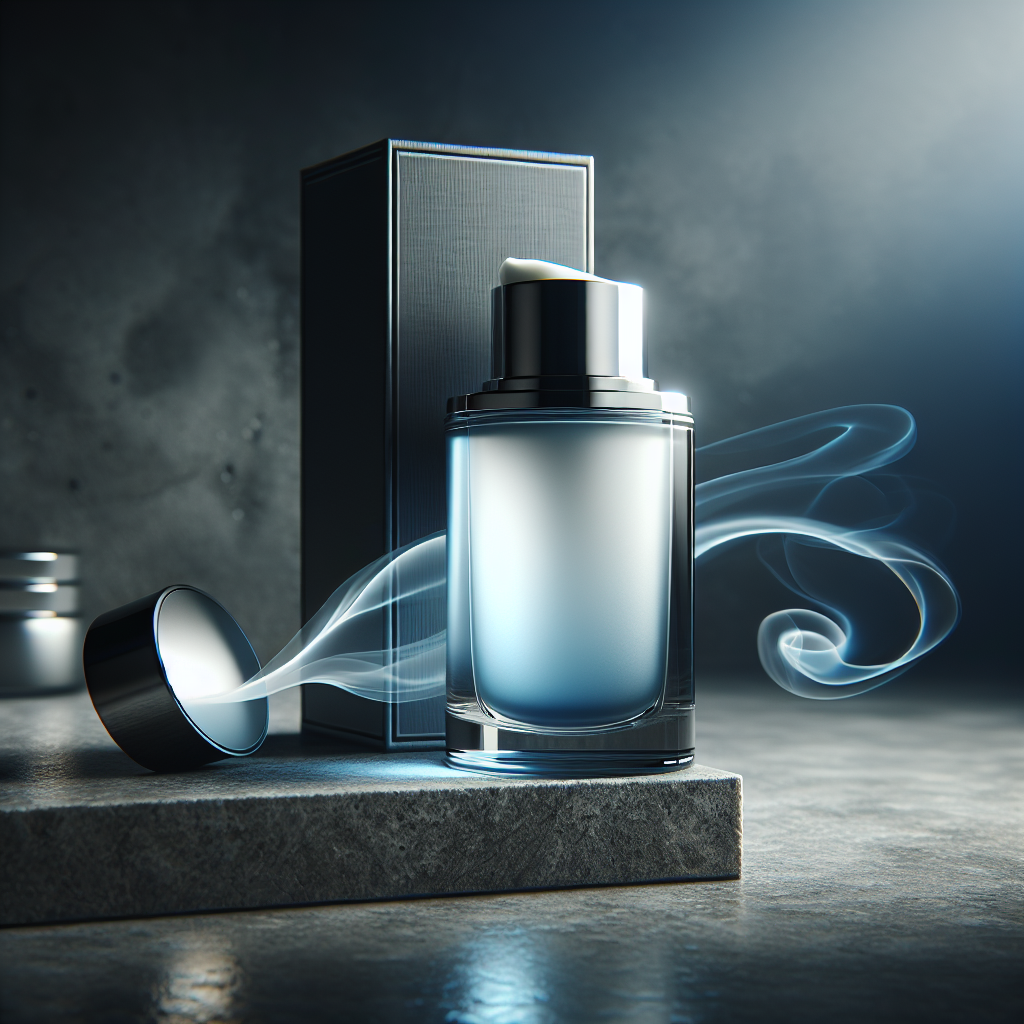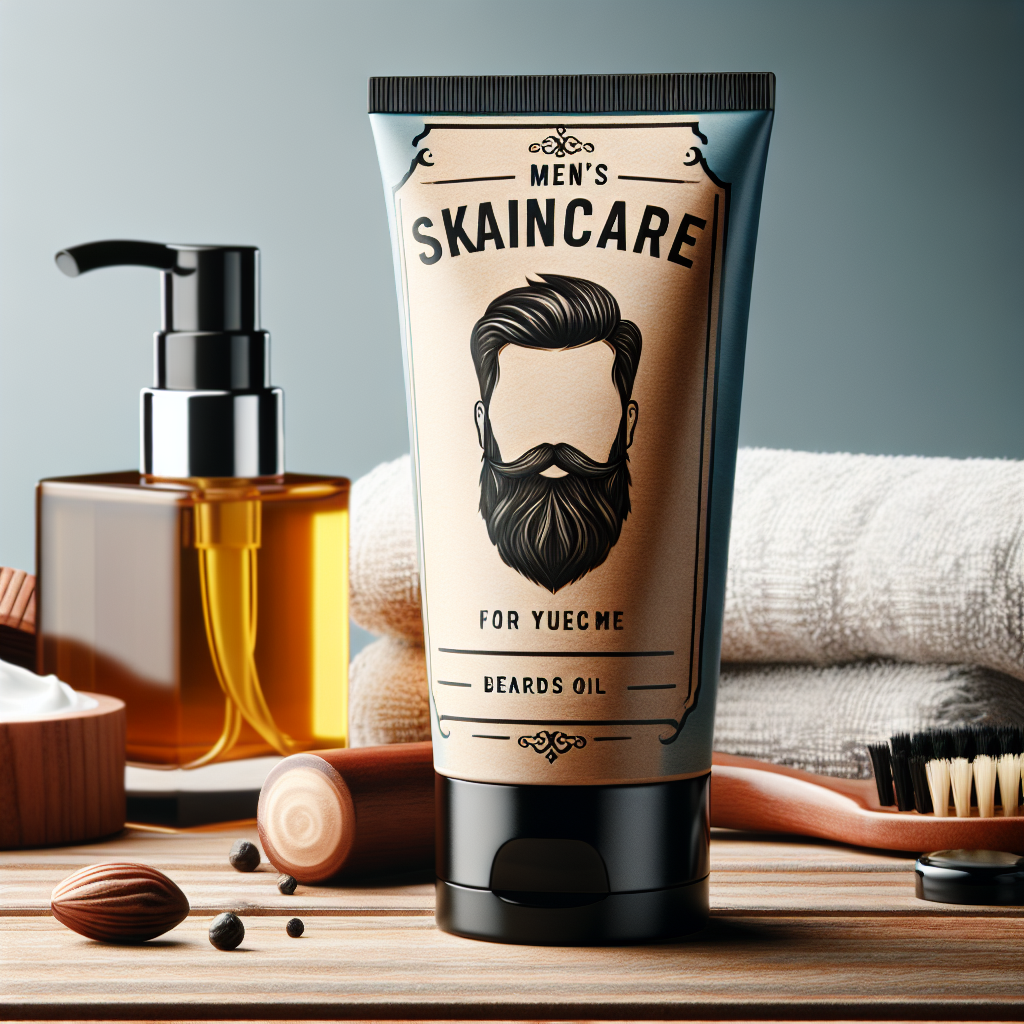If you’re a man looking to up your skincare game, you’ve come to the right place! We understand that finding the perfect skincare routine can feel overwhelming with the plethora of options available, but don’t worry, we’ve got you covered. In this article, we’ll be exploring the world of men’s skincare and providing you with some great suggestions on how to achieve healthy and glowing skin. So sit back, relax, and get ready to elevate your skincare routine to a whole new level! Sure! Having a good skincare routine is important for everyone, including men. Taking care of your skin not only helps you look your best, but it also promotes healthy skin that can combat various skin issues. So, here’s a comprehensive daily, weekly, and monthly skincare routine that you can follow to achieve and maintain healthy, glowing skin.

Daily Skincare Routine
Cleansing
The first step in your daily skincare routine should always be cleansing. Cleansing helps remove dirt, oil, and impurities that can clog your pores and lead to breakouts. Use a gentle cleanser that is suitable for your skin type and massage it onto your damp face in circular motions. Rinse it off with lukewarm water and pat your skin dry with a clean towel.
Exfoliating
Exfoliating is an essential step to achieve smooth and radiant skin. By eliminating dead skin cells, exfoliation helps enhance skin texture and reduce the appearance of dullness. Choose a gentle exfoliant that suits your skin type and exfoliate your face 2-3 times a week. Be careful not to overdo it, as excessive exfoliation can irritate your skin.
Toning
Toning is an often overlooked step in a skincare routine, but it has many benefits. Toning helps restore the pH balance of your skin, minimize the appearance of pores, and hydrate and refresh your skin. Opt for an alcohol-free toner that suits your skin type and apply it to a cotton pad. Gently swipe it across your face, avoiding the delicate eye area.
Moisturizing
Moisturizing is crucial to keep your skin hydrated and prevent dryness and flakiness. It also helps protect your skin from environmental factors that can lead to premature aging. Choose a suitable moisturizer for your skin type and apply it onto your cleansed and toned skin. Make sure to moisturize both in the morning and before going to bed to keep your skin supple and nourished.
Sun Protection
Last but definitely not least, sun protection is crucial for maintaining healthy skin. Shielding your skin from harmful UV rays not only prevents premature aging but also lowers the risk of skin cancer. Use a broad-spectrum sunscreen with at least SPF 30 and apply it generously to your face and any exposed skin. Remember to reapply every two hours, especially if you’re spending a lot of time outdoors.
Weekly Skincare Routine
Face Mask
Using a face mask once a week can provide deep cleansing and nourishing benefits to your skin. Choose a mask that suits your skin type and concerns, whether it’s for hydration, brightening, or purifying. Apply a thin layer of the mask onto your cleansed face and leave it on for the recommended time. Rinse it off with lukewarm water and enjoy the refreshed feeling.
Serum Application
Serums are concentrated formulas that contain active ingredients designed to address specific skin issues. Incorporating a serum into your routine can boost your overall skincare regimen and provide targeted treatment. Choose a serum that suits your concerns, whether it’s for hydration, anti-aging, or brightening. Apply a few drops onto your fingertips and gently pat it onto your face and neck before moisturizing.
Eye Cream
The delicate skin around the eyes requires special attention. Using an eye cream can help moisturize the eye area, reduce the appearance of fine lines and wrinkles, and minimize puffiness and dark circles. Choose an eye cream that suits your specific concerns, whether it’s for hydration, anti-aging, or brightening. Apply a small amount onto your ring finger and gently tap it around the eye area, avoiding direct contact with the eyes.
Lip Care
Don’t forget to give your lips some love in your weekly skincare routine. Lips can become dry and chapped, especially during colder seasons. Use a lip balm or lip mask to moisturize and nourish your lips. Apply a thin layer onto your lips and reapply throughout the day as needed to keep them soft and supple.
Body Moisturizing
While most of our focus is on the face, it’s important to remember to moisturize the rest of your body too. Dry skin can be uncomfortable and can lead to itchiness and flakiness. Apply a body moisturizer or lotion to damp skin after showering to lock in moisture. Pay attention to areas prone to dryness, such as elbows, knees, and feet. Massage the moisturizer onto your skin until fully absorbed.
Monthly Skincare Routine
Professional Facial
Treating yourself to a professional facial once a month can provide deep cleansing, exfoliation, and hydration that may not be possible at home. A licensed esthetician can analyze your skin and tailor the treatment to your specific needs. Enjoy the pampering and let the professionals take care of your skin.
Hair and Scalp Care
Skincare doesn’t stop at your face and body – it also includes your hair and scalp. Taking care of your hair and scalp can improve their health and appearance. Use a shampoo and conditioner suitable for your hair type and address any specific concerns, such as dandruff or dryness. Treat yourself to a nourishing hair mask or scalp treatment once a month to keep your hair and scalp in top condition.
Body Scrub
Exfoliating your body once a month helps remove dead skin cells and promotes smooth and soft skin. Use a body scrub or exfoliating mitt during your shower to gently massage your skin in circular motions. Pay extra attention to areas prone to roughness, such as elbows, knees, and heels. Rinse off the scrub thoroughly and pat your skin dry before applying moisturizer.
Body Hair Removal
If you prefer to remove body hair, whether it’s shaving, waxing, or using other methods, once a month is a good frequency. This allows your skin to recover between sessions and reduces the risk of irritation. Make sure to follow proper techniques and use suitable products to minimize the chances of ingrown hairs or other skin issues.
Foot Care
Last but not least, don’t forget to give your feet some attention in your monthly skincare routine. Our feet can get neglected, leading to dry skin, cracked heels, and other foot issues. Take some time to soak your feet in warm water, exfoliate using a foot scrub or pumice stone, and apply a foot cream or moisturizer to keep your feet soft and supple.
Choosing Suitable Products
Identify Skin Type
Before building a skincare routine, it’s important to identify your skin type. Is your skin oily, dry, combination, or sensitive? Each skin type has specific needs and requires different products. By understanding your skin type, you can choose products that cater to its unique requirements.
Consider Skincare Concerns
In addition to skin type, consider any specific skincare concerns you may have. Are you prone to acne, aging, hyperpigmentation, or other issues? Different products and ingredients can address these concerns effectively. Having a clear understanding of your concerns allows you to select products that target them directly.
Read Labels
When choosing skincare products, it’s important to read labels and understand the ingredients. Look for products with high-quality and beneficial ingredients. Avoid products that contain harsh chemicals, fragrances, or potential irritants. It’s best to opt for products with natural or dermatologist-recommended ingredients.
Avoid Harsh Ingredients
Harsh ingredients can cause irritation, redness, and other skin problems. When choosing skincare products, avoid ingredients such as sulfates, parabens, alcohol, and synthetic fragrances. Instead, opt for gentler ingredients, such as hyaluronic acid, glycerin, and natural oils, that provide hydration and nourishment.
Seek Professional Advice
If you’re unsure about which products to use or how to address specific skincare concerns, seek professional advice. A dermatologist or licensed esthetician can assess your skin and recommend suitable products and treatments. They can also provide personalized advice based on your individual needs and preferences.

Importance of Cleansing
Remove Dirt and Impurities
Cleansing is a crucial step in any skincare routine as it helps remove dirt, oil, and impurities that can accumulate on your skin throughout the day. These pollutants can clog your pores and lead to breakouts or other skin issues. Cleansing clears the canvas, allowing other skincare products to penetrate effectively.
Prevent Acne and Breakouts
Regular cleansing plays a significant role in preventing acne and breakouts. By removing excess oil and impurities, you can keep your pores clean and minimize the chances of clogged pores and bacterial growth. This, in turn, reduces the risk of acne flare-ups and helps maintain clear and blemish-free skin.
Promote Radiant Skin
Cleansing also helps promote radiant skin by eliminating dullness and allowing your skin’s natural glow to shine through. When your skin is free from dirt and impurities, it appears brighter and healthier. Cleansing in the morning can help refresh your skin and create a vibrant canvas for makeup application.
Use Suitable Cleansers
Choosing a suitable cleanser for your skin type is crucial to ensure proper cleansing without causing irritation or dryness. If you have oily or acne-prone skin, opt for a gel or foaming cleanser that helps control excess oil. For dry or sensitive skin, choose a creamy or hydrating cleanser that provides moisture while effectively cleansing your skin.
Adopt Double Cleansing
Double cleansing is an effective technique, especially for those who wear makeup or sunscreen. It involves using an oil-based cleanser first to remove makeup, dirt, and oil, followed by a water-based cleanser to ensure a thorough cleanse of the skin. Double cleansing helps remove all traces of impurities and prepares your skin for subsequent skincare steps.
Exfoliating for Smooth Skin
Eliminate Dead Skin Cells
Exfoliating is an essential step in a skincare routine to eliminate dead skin cells that can build up on the surface of your skin. These dead cells can make your skin appear dull, rough, and congested. Regular exfoliation helps unveil fresh and smoother skin, promoting an overall healthy and radiant complexion.
Enhance Skin Texture
By removing dead skin cells, exfoliating helps enhance your skin’s texture and refine its appearance. It can reduce the visibility of fine lines, wrinkles, and rough patches, leaving your skin smooth and soft to the touch. Exfoliation also promotes cell turnover, which can further improve the texture of your skin over time.
Reduce Ingrown Hairs
Exfoliating can also help reduce the occurrence of ingrown hairs, particularly in areas prone to shaving or waxing, such as the face, bikini line, and legs. By clearing away dead skin cells and unclogging pores, exfoliation allows hair to grow out more easily, reducing the chances of it getting trapped beneath the surface.
Choose the Right Exfoliant
When choosing an exfoliant, consider your skin type and sensitivity. Physical exfoliants, such as scrubs with particles or brushes, can be effective but may be too harsh for sensitive or acne-prone skin. Chemical exfoliants, such as AHAs (alpha hydroxy acids) or BHAs (beta hydroxy acids), offer a gentler exfoliation and are suitable for most skin types.
Don’t Overdo It
While exfoliation is beneficial, it’s important not to overdo it. Excessive or aggressive exfoliation can cause irritation, redness, and even damage to your skin’s barrier. Limit exfoliating to 2-3 times a week, and adjust the frequency based on how your skin reacts. Listen to your skin and give it time to recover between exfoliation sessions.

Toning for Balanced Skin
Restore pH Balance
Toning is a step that helps restore the pH balance of your skin after cleansing. Cleansers, especially those that foam or have a high pH, can disrupt your skin’s natural pH, which should ideally be slightly acidic. Toning helps bring your skin back to its optimal pH, ensuring a balanced and healthy complexion.
Minimize Pores
Toners can also help minimize the appearance of pores, particularly those that are prone to being more visible. Toners can remove any residual impurities, tighten the skin, and temporarily shrink the pore size. With continued use over time, toning can help maintain the overall appearance of smoother and refined skin texture.
Hydrate and Refresh
Many toners are formulated with hydrating ingredients that can replenish and refresh your skin. They provide an extra layer of hydration, which is especially beneficial for those with dry or dehydrated skin. Toners can also help prep your skin for the absorption of subsequent skincare products, allowing them to penetrate more effectively.
Use Alcohol-Free Toners
Alcohol-based toners can be overly drying and irritating, particularly for those with dry or sensitive skin. Instead, opt for alcohol-free toners that are gentle and suitable for all skin types. Look for toners that contain soothing and hydrating ingredients, such as aloe vera, hyaluronic acid, or chamomile extract.
Consider Specific Concerns
If you have specific skin concerns, such as acne, aging, or hyperpigmentation, consider using toners that target those issues. There are toners available with ingredients like salicylic acid for acne-prone skin, antioxidants for anti-aging benefits, or brightening agents for hyperpigmentation. Select toners that address your specific concerns to enhance the overall effectiveness of your skincare routine.
Moisturizing to Hydrate Skin
Maintain Skin Moisture
Moisturizing is a vital step in any skincare routine to maintain skin moisture. Even if you have oily skin, proper hydration is crucial to keep your skin healthy and balanced. Moisturizers help provide a protective barrier on your skin’s surface, preventing moisture loss and keeping your skin supple and hydrated.
Prevent Dryness and Flakiness
Dryness and flakiness can be uncomfortable and lead to skin issues such as itching, redness, and irritation. Regular moisturizing helps prevent these problems by replenishing the skin’s moisture levels and soothing dry and sensitive areas. Look for moisturizers with hydrating ingredients like hyaluronic acid or ceramides to provide long-lasting hydration.
Protect from Environmental Factors
Moisturizers also act as a shield against environmental factors that can damage your skin. They create a barrier that helps protect your skin from harsh weather conditions, pollution, and other external aggressors. Using a moisturizer with added antioxidants can provide extra protection, neutralizing free radicals and minimizing the impact of environmental stressors.
Choose Suitable Moisturizers
When choosing a moisturizer, consider your skin type and specific concerns. For oily or acne-prone skin, opt for lightweight, oil-free, or gel-based moisturizers that won’t clog your pores. Dry or mature skin can benefit from richer creams or emollient-based moisturizers for added hydration and nourishment. Combination or normal skin types can generally use a wider range of moisturizing options.
Apply Day and Night
Moisturizing should be a part of your skincare routine both in the morning and before going to bed. Applying moisturizer in the morning helps create a smooth canvas for makeup application and provides hydration throughout the day. Moisturizing at night allows your skin to repair and regenerate while you sleep, promoting optimal skin health.

Sun Protection is Crucial
Shield from Harmful UV Rays
Sun protection is an absolute must in any skincare routine, regardless of gender. Shielding your skin from harmful UV rays is the most effective way to prevent sunburn, premature aging, and skin cancer. UV rays can penetrate through clouds and windows, so it’s important to incorporate sun protection as a daily habit.
Prevent Premature Aging
Prolonged sun exposure can lead to premature aging, including wrinkles, fine lines, age spots, and sagging skin. The damaging effects of the sun’s UV rays can accelerate the breakdown of collagen and elastin, which are responsible for maintaining your skin’s elasticity and firmness. Applying sunscreen regularly can help slow down these signs of aging.
Lower Risk of Skin Cancer
Skin cancer is the most common form of cancer in the world, and UV radiation is one of its main causes. By consistently using sun protection, you can significantly lower your risk of developing skin cancer, including melanoma, the deadliest form of the disease. Protecting your skin from UV rays is a vital step in maintaining your long-term health.
Apply Broad-Spectrum SPF
When choosing a sunscreen, opt for a broad-spectrum formula that protects against both UVA and UVB rays. UVA rays penetrate deeper into the skin, causing long-term damage, while UVB rays primarily cause sunburn. Look for a sunscreen with at least SPF 30 for daily use and apply it generously to all exposed areas of your skin.
Reapply as Needed
Applying sunscreen once is not enough. For effective sun protection, remember to reapply sunscreen every two hours, especially if you’re sweating, swimming, or spending extended periods outdoors. Even water-resistant sunscreens can wear off, so regular reapplication ensures continuous protection throughout the day.
Using Serums for Targeted Treatment
Deliver Concentrated Ingredients
Serums are highly concentrated formulations that contain potent active ingredients. These concentrated ingredients can penetrate deep into the skin, delivering targeted treatment and addressing specific skin issues effectively. Serums can provide a more concentrated dose of ingredients than other skincare products.
Address Specific Skin Issues
Whether you’re struggling with acne, hyperpigmentation, or aging skin, serums offer a wide range of benefits. There are serums available to target specific concerns, such as hyaluronic acid for hydration, vitamin C for brightening, or retinol for anti-aging. Identify your skincare concerns and choose serums that contain ingredients proven to address those issues.
Boost Overall Skincare
Incorporating a serum into your skincare routine can boost the overall effectiveness of your regimen. Serums often contain a combination of beneficial ingredients that work synergistically to provide multiple benefits. They can help improve skin texture, reduce the appearance of fine lines, enhance skin elasticity, and give your skin a healthy, radiant glow.
Choose Serums Wisely
When selecting a serum, consider your specific skin type and concerns. Some serums may be more suitable for oily or acne-prone skin, while others are formulated for dry or sensitive skin. Look for serums that are free from potentially irritant ingredients and contain a high concentration of beneficial actives.
Apply Before Moisturizer
To maximize the benefits of your serum, apply it onto cleansed and toned skin before moisturizing. Serums are usually lightweight and have a thin consistency, allowing them to be easily absorbed. Apply a few drops onto your fingertips and gently pat it onto your face and neck, avoiding the delicate eye area. Once the serum has been absorbed, follow up with your moisturizer.
So there you have it – a comprehensive skincare routine for men. By following these daily, weekly, and monthly steps, you can establish a routine that addresses your skin’s needs and helps you maintain healthy and radiant skin. Remember to choose suitable products, protect your skin from the sun, and seek professional advice when needed. Here’s to healthy and glowing skin!






